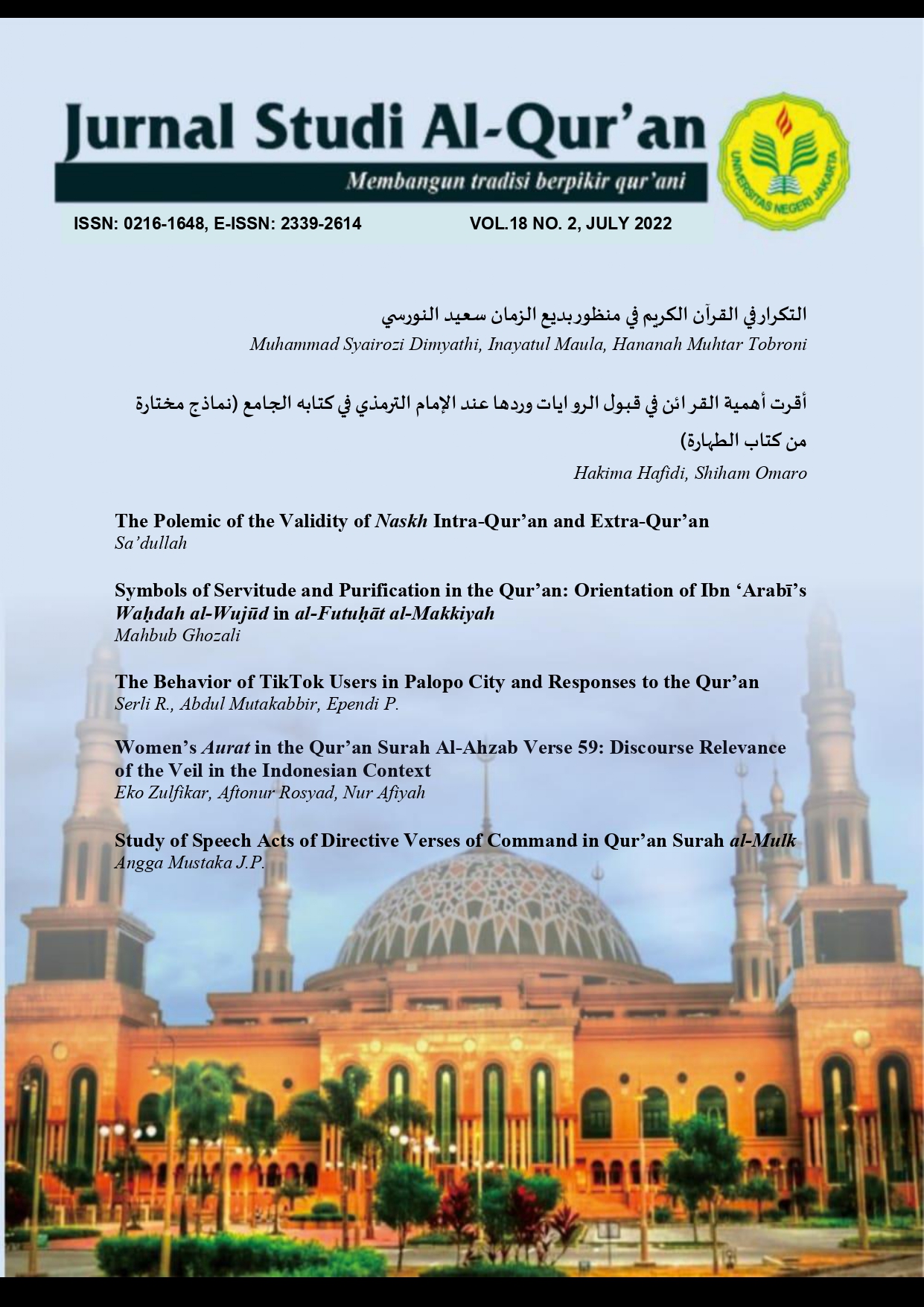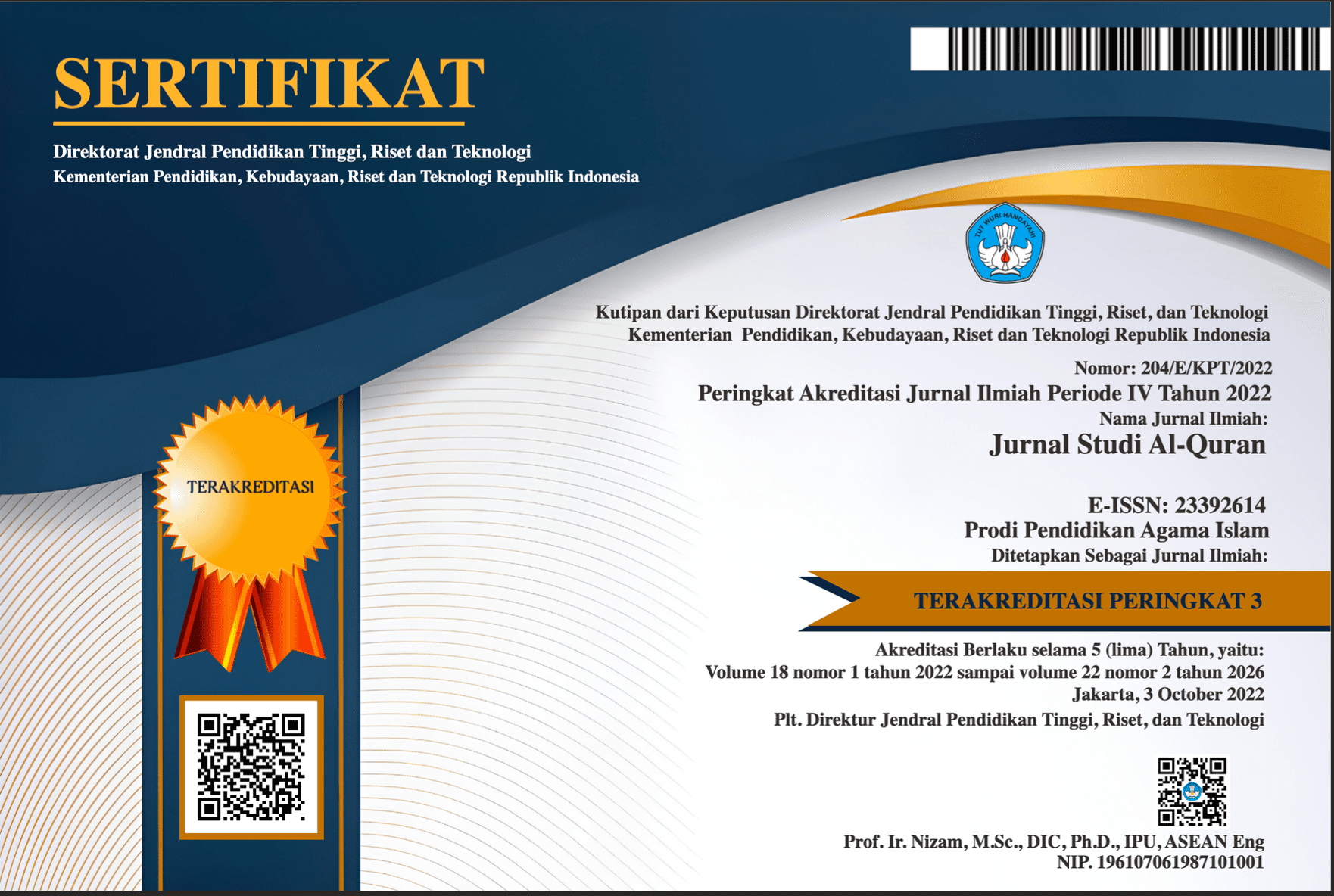The Polemic of the Validity of Naskh Intra-Qur’an and Extra-Qur’an
DOI:
https://doi.org/10.21009/JSQ.018.2.03Keywords:
Naskh, Intra-Qur'anic, Extra Qur'anic, ControversyAbstract
The Polemic of the Validity of Intra-Qur'an and Extra-Qur'an Texts. Islamic Education Department, Faculty of Social Sciences, Jakarta State University. Two texts are polemic in this discussion, namely intra-Qur'anic texts (deletion between verses) and extra Qur'anic texts (deletion of the Koran on previous holy books and religions). The naskh polemic occurred because of the uncertainty about whether any verses of the Qur'an were in the text, some acknowledged. Still, others rejected, for various reasons, the mansukh of the poetry of the Qur'an. The term naskh, which means "annulment", was initially used to describe fiqh/Islamic law issues but later developed into the cancellation of pre-Qur'an revelations. Based on this, this study intends to reveal whether the revelation of the Qur'an replaces or cancels all other disclosures so that the concept of naskh is associated with Muhammad's apostolic position regarding the success of saving other monotheistic traditions. The results of this discussion reveal that the focus of the text is not on the cancellation of the verses of the Qur'an (Intra Qur'an). Still, the cancellation of the previous law or sharia (syar'u ma qoblana), either partially or entirely by Islamic law as stated by Al-Jabiri, so that the latter is called the extra text of the Qur'an. However, in general, for the two types of texts, there is still an assumption that the abolition of the previous verse or treatise means denying some of the rules of the text theory itself. It is even considered the same as rejecting the poetry of the Qur'an as the best teaching of religion, as in the QS verse. Al-Baqarah [2]: 106 only expresses the presupposition, not the necessity of the text. Meanwhile, all of the verses of the Qur'an are still valid and cooperative. Even if there is a contradiction, it must be understood proportionally based on socio-historical conditions, not by eliminating verses (Intra-Qur'an texts).
References
‘Abd Wahhāb Khallaf, Uṣūl al-Fiqh (t.tp.: Dār al-Qalam, 1978).
‘Ali al-Awsī, al-Ṭabāṭabā’ī wa Manhajuh fī Tafsīr al-Mizan (Teheran: Sepehr, 1985).
Abd al-Karīm al-Khaṭīb, Tafsīr al-Qur’ān li al-Qur’ān, Vol. I (Ttp. : Dār al-Fikr, tt).
Abd al-Karīm Khaṭīb, Tafsir al-Qur’ān li al-Qur’ān (Ttp. : Dār al-Fikr, Vol. I, tt).
Abd Muta’āl Muḥammad al-Jabrī, al-Nāsikh wa al-Mansūkh bayna al-Ithbāt wa al-Nafy (Kairo: Maktabah Wahbah, 1987).
Abdulaziz Sachedina, "Is Islamic Revelation an Abrogation of Judaeo-Christian Revelation? Islamic Self-identification in the Classical and Modern Age." Concilium 3 (1994).
Abdulaziz Sachedina, The Islamic Roots of Democratic Pluralism.
Abdullah Ahmed an-Na’im, Dekonstruksi Syari’ah, (terj.) Amiruddin Ar-Rani (Yogyakarta: LKiS, 1994).
Abī al-Fidā’ Ismail ibn Umar ibn Kathīr, Tafsīr al-Qur’ān al-‘Aẓīm, Juz I (Beirut: Dār al-Fikr, 2005).
Abī al-Ḥasan ‘Alī ibn Aḥmad al-Wahidi, Asbāb al-Nuzūl (Kairo: Dār al-Ḥadīth, 2003), 34-35.
Abī al-Ḥuseyn Aḥmad Ibn Fāris ibn Zakaria, Mu’jam al-Maqāyaīs Fī Al-lughah (Beirut: Dār al-Fikr, 1994).
Abī al-Qāsīm al-Ḥuseyn bin Muḥammad bin al-Mufaḍḍal dikenal dengan sebutan al-Rāghib al-Aṣfahānī, Mu’jam Mufradāt Alfaẓ al-Qur’ān (Beirut: Dār al-Kutub al-‘Alamiyyah, Cet. III, 2008).
Abu ‘Abdullāh Muhammad ibn Aḥmad al-Qurṭubī, al-Jāmi’ li Ahkām al-Qur’ān, Vol. X (Mesir: Dār al-Kitāb al-‘Arabī, 1967).
Abū Abdulah Muḥammad ibn Idris al-Shāfi’ī, al-Risālah fi al-Uṣūl (Mesir: Maktabah Dār al-Turath, 2005).
Abu Abdullah al-Mu`ṭi Muḥammad Nawawī ibn Umar, Rauḍah al-Ṭālibīn wa ‘Umdah al-Muftīn( Beirut: al-Maktab al-Islāmī, Vol. 10, 1405 H).
Abū al-Qāsim Habat Allāh Ibn Salamah, al-Nāsikh wa al-Mansūkh (Mesir, Muṣṭosa al-Bābī al-Ḥalabī, 1960).
Abu al-Qāsim Hibatullah ibn Salāmah, al-Nāsikh wa al-Mansūkh (Beirut: Maktab al-Islāmī, 1404 H.).
Abū Bakr Muḥammad ibn Isḥaq ibn Khuzaymah, al-Mu’jiz fī al-Nāsikh wa al-Mansūkh, dicetak dibagian belakang karya Abu Ja’far al-Naḥḥas, Kitab al-Nāskh wa al-Mansūkh (Ttp.: t.np.: t.t.).
Abū Muḥammad Ali ibn Aḥmad ibn Sa’īd ibn Ḥazm, al-Nasikh wa al-Mansūkh fī al-Qur’ān al-Karīm (Beirut: Dār al-Kutub al-‘Ilmiyyah, 1406 H.).
Abū Muḥammad Ali ibn Aḥmad ibn Sa’īd ibn Ḥazm, Ma’rifah al-Nāsikh wa al-Mansūkh, Ḥāshiyah kitab Jalāl al-Dīn al-Suyūṭī, Tafsīr al-Qur’ān al-‘Aẓīm (Indonesia: Dār al-Ihyā’ al-Arabiyah, t.t.).
Abū Zakaria Muḥy al-Dīn Yaḥya ibn Sharf al-Nawawī, Sharḥ Muslim, Jilid VI/Juz II (Beirut: Dār al-Fikr, 1978).
Ah. Fawaid, “Polemik Nasakh dalam Kajian Al-Qur’an,” dalam ṢUḤUF; Jurnal Kajian Al-Qur’an, 255.
Ahmad Hassan, Pintu Ijtihad Belum Tertutup( terj.) Agah Garnadi (Bandung: Pustaka, 1984).
Ahmad Husnan, Hukum Islam Tidak Mengenal Reaktualisasi (Solo: Pustaka Mantiq, 1989).
Al-Bahūṭī, Kashshāf al-Qinā’ ‘an Matn al-Iqnā’, Vol. 6 (Beirut: Dār al-Fikr, 1982).
Al-Bāqūrī, Ma’ānī al-Qur’ān bayna al-Riwāyah wa al-Dirāyah (Kairo: Markaz al-Ahrām li al-Turjumah wa al-Nashr, 1986).
Ali Jum’ah, al-Naskh ‘Inda al-Uṣuliyyīn (Kairo: Nahḍah Miṣr, 2005).
Al-Maraghi, Tafsir al-Maraghi, Vol. I, 187.
Al-Samaw’al ibn Yahya al-Maghribī, Ifḥām al-Yahūd wa Qiṣṣah Islām al-Samaw’al wa Ru’yah al-Nabīy Ṣalla al-Lāh ‘alayh wa Sallam (Beirut: Dār al-Jayl, 1990).
Al-Ṭabarī, Jāmi’ al-Bayān ‘an Ta’wīl al-Qur’ān, Vol. II (Mesir: Muṣṭofa al-Bābī al-Halabī, 1968).
Anggraeni, D. (2016). Agama Pra-Islam Perspektif Al-Qur'an. Jurnal Studi Al-Qur'an, 12(1), 49-76.
Asnajib, M. (2020). Penafsiran Kontemporer di Indonesia. Jurnal Studi Al-Qur'an, 16(2), 181-196.
Badr al-Dīn Muhammad al-Zarkasyī, al-Burhān fī ‘ulūm al-Qur’ān, Juz II (Kairo : ‘Īsa al-Bābī al-Ḥalabī, t.t.).
Djamdjuri, D. S., Zuriyati, Z., & Attas, S. G. (2022). Metaphor in Parable from the Noble Qur’an: A Corpus Based Stylistic Approach. Jurnal Studi Al-Qur'an, 18(1), 59-73.
Effendi, M. R. (2021). TEOLOGI ISLAM Potret Sejarah dan Perkembangan Pemikiran Mazhab Kalam. Literasi Nusantara.
Fadhil, A., Hakam, A., Effendi, M. R., Nurpratiwi, S., & Amaliyah, A. (2022). Socio-Cultural Revitalization, as an Effort to Empower the Character of Humanism in Students.
Faruq Sherif, al-Qur’an Menurut al-Qur’an; Menelusuri Kalam Tuhandari Tema ke Tema , terjemah dari Guide to The Contens of The Qur’an (Jakarta: Serambi, 1995).
Hans Wehr, A Dictionary of Modern Written Arabic, J. Milton Cowan (London: Mc Donald W. Ltd., 1980).
Hasan Alwi dkk. Kamus Besar Bahasa Indonesia (Jakarta: Balai Pustaka, Edisi ketiga, Cet. III, 2005)
Ibn Jawzī, Nawāsikh al-Qur’ān (Beirut: Dār al-Kutub al-‘Ilmiyyah, 1405 H.), 14.
Isnaini, S. N. (2021). Tafsir Ayat-Ayat Teologis dalam al-Muharrar al-Wajiz: Studi Kritis Atas Tuduhan I’tizal terhadap Ibnu Athiyyah. Jurnal Studi Al-Qur'an, 17(2), 207-231.
Jane McAuliffe, Qur'anic Christians an Anakiysis of Classical and Modern Exegesis (Cambridge: Cambridge University Press, 1991).
John M .Echols dan Hassan Shadily, Kamus Inggris Indonesia (Jakarta: Gramedia Pustaka Utama, 2006).
M. Akram Rana, "Hanafi Doctrine of Nasakh (Abrogation)", dalam Hamdard Islamics, Vol. 22 (199), No. 3.
M. Quraish Shihab dkk, dalam Ensiklopedi al-Qur’ān: Kajian Kosakata, (ed.) Sahabuddin, Vol. I (Jakarta: Lentera Hati, 2007).
M. Quraish Shihab, Membumikan al-Qur’an: Fungsi dan Peran Wahyu dalam Kehidupan Masyrakat (Bandung: Mizan, Cet. III, 2009).
Maḥmoud Muḥammad Ṭāhā, al-Risālah al-Thāniyah (t.tp: t.np., t.t).
Mannā’ al-Qaṭṭān, Mabahith fī ‘Ulūm al-Qur’ān (t.tp.: Dār al-Qalam, 1978).
Mardhiah, I., Hadiyanto, A., Amaliyah, A., & Hakam, A. (2021). Developing Learning Competencies of Multicultural and Local Wisdom Values-Based Islamic Religious Education in Higher Education in Indonesia. Hayula: Indonesian Journal of Multidisciplinary Islamic Studies, 5(1), 81-92. https://doi.org/10.21009/005.01.04
Muḥammad al-Muta’āl al-Jabrī, al-Naskh fī al-Syarī’at al-Islāmiyah Kamā Afhamuhu (Kairo: Maktabah Wahbah, 1987).
Muhammad ‘Abd al-‘Aẓīm al-Zarqānī, Manāḥil al-‘Irfān fī ‘Ulūm al-Qur’ān, Juz II (t.tp : ‘Isa al-Bābi al-Halabi, tt.).
Muhammad Abu Zahrah, Uṣūl al-Fiqh (t.tp.: Dār al-Fikr al-Arabī, t.t.).
Muḥammad al-Ghazālī, Naẓar fī al-Qur’ān (Kairo: Nahḍat Miṣr li al-Ṭaba’at, 2005).
Muḥammad Fakh al-Dīn al-Rāzī, al-Tafsīr al-Kabīr, Vol. I (Beirut: Dār al-Fikr, 1988).
Muḥammad Fu’ad Abd Bāqī, Al-Mu’jam al-Mufahras li Alfaẓ al-Qur’ān al-Karīm (Cairo: Dār al-Ḥadith, 2007), 793.
Muḥammad ibn ‘Abdullāh al-Zarkashī, al-Burhān fī ‘Ulūm al-Qur’ān, Jilid II (Kairo: Maktabah Dār al-Turath, tt.).
Muḥammad ibn Mukrim ibn Alī Abū al-Faḍl Jamāl al-Dīn Ibnu Manẓūr,. Lisan al-‘Arab, Juz III (Beirut: Dār al-Ṣādir, 2003)
Muhammad Makki ibn Abī Ṭalib al-Qaysī, Al-Īḍāh li Nāsikh al-Qur’ān wa Mansukhīh (Saudi Arabia: University Muhammad Suud, 1976).
Munawwir Syadzali, et. al, Polemik Reaktualisasi Ajaran Islam (Jakarta: Pustaka Panjimas, 1989).
Mūsa Ibrāhīm, Buḥūth manhajiyyah fī ‘Ulūm al-Qur’an (Oman: Dār ‘Ammar, 1996).
Muslim ibn al-Ḥajjāj al-Qushairī al-Naisabūrī, Ṣaḥīḥ Muslim, Vol. IV, (Beirut: Dār Iḥyā’ al-Turath, tt.), 167.
Muṣṭafā Muḥammad Sulaiman, Al-Naskh fī al-Qur’ān al-Karīm: wa al-Rād ‘alā Munkarīh (Mesir: al-Amānah, 1991).
Muṣṭafā Zayd, Al-Naskh fī al-Sharī’ah al-Islāmiyah, Juz. I (Beirut: Dār al-Fikr, 1971).
Ruslani, Masyarakat Kitab dan Dialog Antar Agama, Studi atas Pemikiran Mohammad Arkoen (Yogyakarta: Yayasan Bintang Budaya, Cet. 1, 2000).
Sayyid Muḥammad Rashīd Riḍā’, Tafsir al-Manār, Vol. I (Beirut: Dār al-Fikr, 1973).
Sayyid Muḥammad Rashīd Riḍā’, Tafsir al-Manār, Vol. I (Beirut: Dār al-Fikr, 1973).
Sha’bān Muḥammad Ismā’īl, Naẓariyyat al-Naskh fī al-Sharāi’ al-Samāwiyyah (Kairo: Dār al-Salām, 1988).
Ṣubḥī al-Ṣālih, Mabāhith fī ‘Ulūm al-Qur’ān (Beirut: Dār al-‘Ilm li al-Malāyīn, 1987).
Tim Winter, "The Last Trump Card: Islam and the Suppersession of Other faiths," Studies in Interreligious Dialogue 9l2 (1999).
Wahbah al-Zuḥaylī, al-Tafsīr al-Munīr fī al-‘Aqīdah wa al-Sharī’ah wa al-Manhaj, Vol. 1-2 (Damaskus: Dār al-Fikr, 2003).
Walīy Allāh al-Diḥlawi, Al-Fawz al-Kabīr fi Uṣūl al-Tafsīr (Cairo: Dār al-Ṣaḥwah, 1984).
Downloads
Published
How to Cite
Issue
Section
License
Authors who publish with this Journal agree to the following terms:
- Author retain copyright and grant the journal right of first publication with the work simultaneously licensed under a creative commons attribution licensethat allow others to share the work within an acknowledgement of the work’s authorship and initial publication of this journal.
- Authors are able to enter into separate, additional contractual arrangementfor the non-exclusive distribution of the journal’s published version of the work (e.g. acknowledgement of its initial publication in this journal).
- Authors are permitted and encouraged to post their work online(e.g. in institutional repositories or on their websites) prior to and during the submission process, as it can lead to productive exchanges, as well as earlier and greater citation of published works.
Users/public use of this website will be licensed to CC BY










